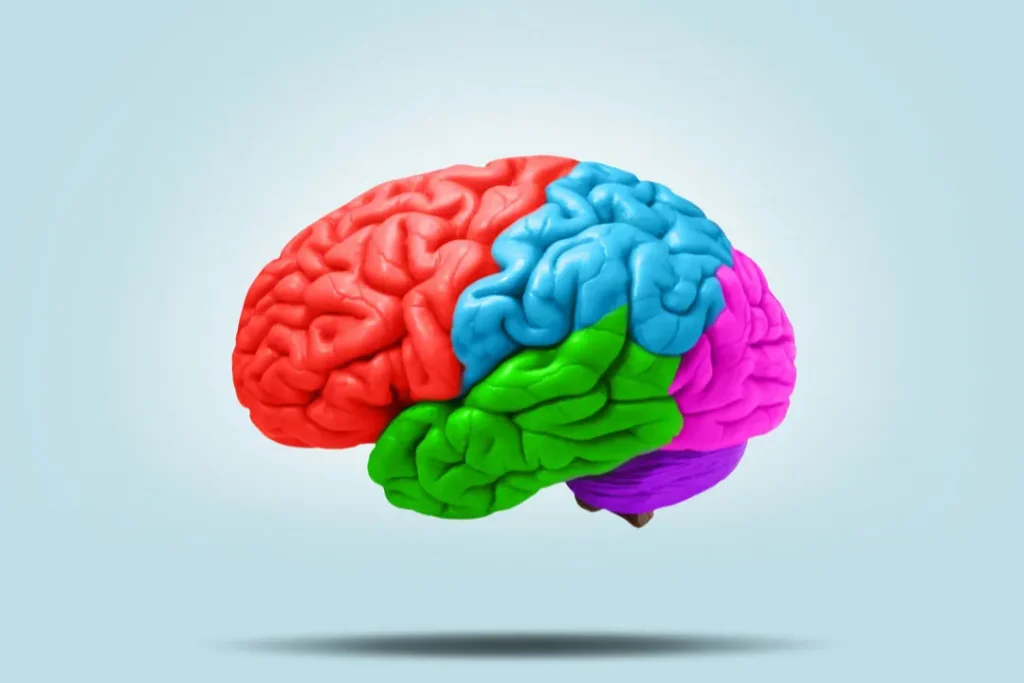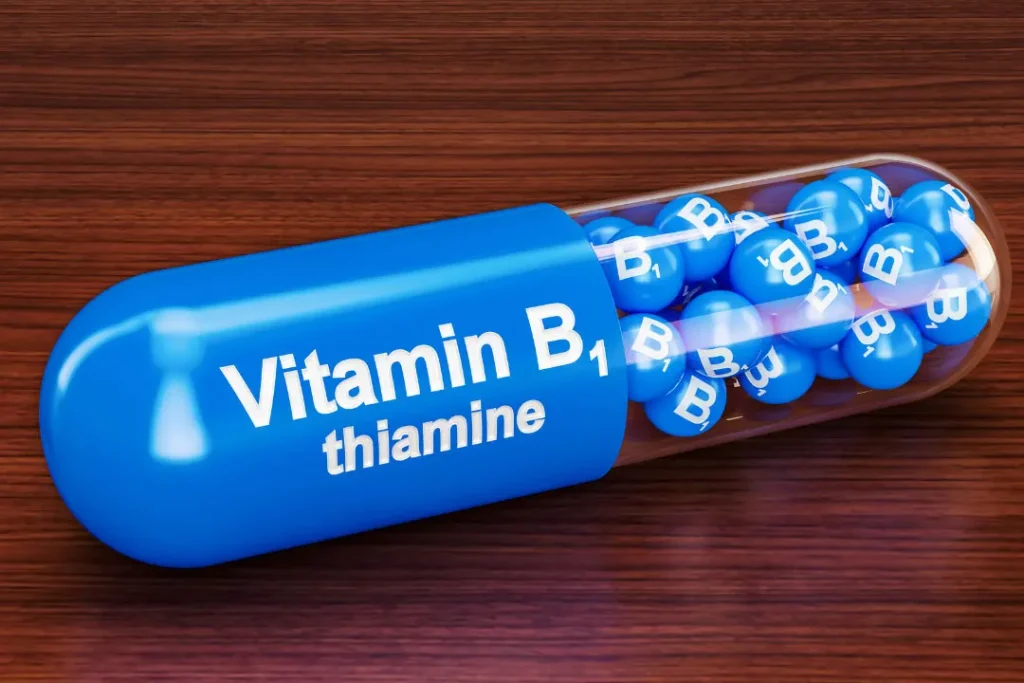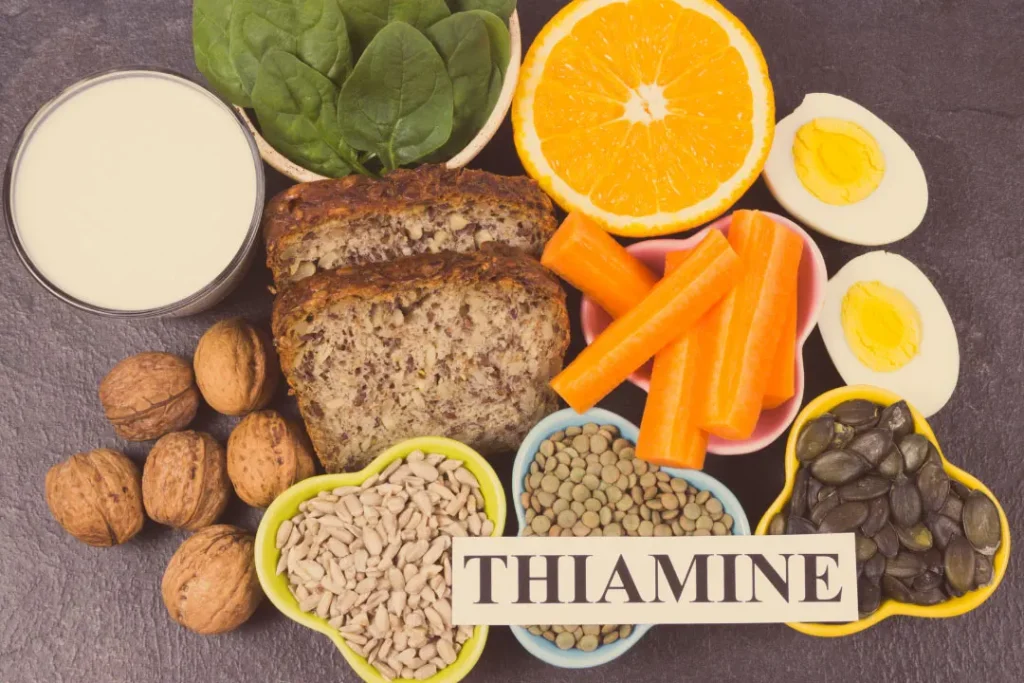Thiamine, generally referred to as vitamin B1, is a water-soluble vitamin essential for the body’s healthy operation. It cannot be manufactured by the body and must be obtained from the diet because it is an essential nutrient. Many foods, such as whole grains, nuts, legumes, and meat, contain thiamine. The transformation of carbohydrates into energy, the production of neurotransmitters, and the preservation of nerve and muscle function are just a few of the metabolic processes that thiamine is involved in.
Despite the rarity of thiamine deficiency, thiamine supplementation has gained popularity as a nootropic due to its potential advantages for improving memory, learning, and cognition. This article seeks to examine the nature of thiamine, its health advantages, the recommended dosage, any negative effects, any drug interactions, and the responsible use of thiamine supplements.
You May Also Like:
Should You Try CBD for Focus? Here Are the Facts.
Health Benefits of Thiamine
1. Energy Metabolism: Thiamine plays a key role in the metabolism of energy. It is crucial for the efficient operation of the citric acid cycle and aids in the conversion of carbohydrates into energy. Lack of thiamine can cause weakness, weariness, and poor exercise performance.
2. Nervous System: Thiamine is essential for the nervous system to function properly. It participates in the production of acetylcholine, which is crucial for memory and learning.
3. Cardiovascular Health: Thiamine supports the healthy operation of the heart and blood vessels, which contributes to the maintenance of cardiovascular health.
4. Brain Function: Thiamine has been demonstrated to enhance cognitive function in people with dementia and Alzheimer’s disease. Moreover, it could elevate mood and ease anxiety.

Chemistry of Thiamine
The chemical formula of this vitamin is C12H17N4OS+Cl-. A methylene bridge connects a pyrimidine ring and a thiazole ring to make up the compound. As mentioned, thiamine must be taken through dietary sources because it cannot be produced by the body. Thiamine is absorbed and phosphorylated to produce thiamine pyrophosphate (TPP), which is the active form of thiamine. Many enzymatic processes, including the metabolism of carbohydrates, amino acids, and fatty acids, involve the coenzyme TPP.
Physiological Mechanism of Thiamine
Thiamine functions as a coenzyme in the transformation of carbohydrates into energy, playing a significant part in energy metabolism. Both the alpha-ketoglutarate dehydrogenase complex, which is engaged in the citric acid cycle, and the pyruvate dehydrogenase complex, which converts pyruvate to acetyl-CoA, involve the involvement of thiamine. The creation of neurotransmitters, such as acetylcholine, as well as the healthy operation of the heart, muscles, and nervous system are all facilitated by thiamine.
Optimal Dosage of Thiamine
The ideal thiamine dosage varies with age, gender, and health state. For adults, the recommended daily intake (RDA) for thiamine is 1.2 mg for men and 1.1 mg for women. Women who are pregnant or nursing need more thiamine; their recommended daily allowances are 1.4 mg and 1.5 mg, respectively. Due to higher energy needs, athletes and people who engage in high levels of physical exercise may need more thiamine as well.
Side Effects of Thiamine
When used in the recommended dosages, thiamine is usually regarded as safe. Thiamine side effects, including nausea, vomiting, diarrhea, and allergic reactions, can occur at high doses. In rare cases, taking an overdose of thiamine can cause anaphylaxis. It is crucial to remember that before using thiamine supplements, if you have any specific medical conditions, such as kidney disease or alcoholism, or are taking specific medications, like diuretics or anticonvulsants, should speak with your doctor.

Potential Substance Interactions with Thiamine
Most drugs do not normally interact with thiamine. Nevertheless, it might prevent other medications from being absorbed, including levodopa, which is used to treat Parkinson’s disease. Before using thiamine supplements, people taking levodopa should speak with their doctor.
Best Responsible Use of Thiamine
As a nootropic supplement, thiamine has grown in popularity due to its potential for nootropic enhancements. MyPEAK Supplements’ Brilliance is a thiamine formulation that is extremely bioavailable and a great option if you are looking to use thiamine as a nootropic supplement.
To prevent any negative effects, it’s crucial to use thiamine responsibly and at the recommended amounts when utilizing it as a nootropic supplement. To ensure the safe and effective usage of any supplement, including thiamine, it is also advised to speak with a healthcare professional before taking it. To maximize the benefits of thiamine, as with any supplement, it is essential to conduct your research and make wise choices about how to use it.

Thiamine:
Conclusion
If you are seeking a supplement that helps you in energy metabolism as well as having some nootropic ability, then, you should consider including thiamine in your diet. Once thiamine supplements have been ingested, they will be converted into TPP which is involved in many enzymatic processes. Hence, thiamine is an efficient vitamin that can help the body metabolize fats and protein as well as improve your memory and learning ability.
In this regard, choosing a quality niacin supplement such as Brilliance from myPeak supplements would be an excellent choice as it is a trustworthy and reputable source of thiamine. It is also essential for you to seek advice from medical practitioners to know the appropriate dosage and combination of thiamine supplements that work best for you.
References
- Vitamin B1 (Thiamine). Link: https://pubmed.ncbi.nlm.nih.gov/29493982/#:~:text=Vitamin%20B1%20is%20one%20of,to%20maintain%20proper%20blood%20levels.
- Roles of Thiamine in Health and Disease. Link: https://pubmed.ncbi.nlm.nih.gov/30644592/
- The Effects of Endurance Training and Thiamine Supplementation on Anti-Fatigue During Exercise. Link: https://pubmed.ncbi.nlm.nih.gov/25566430/#:~:text=To%20sum%20up%20the%20previous,similar%20benefits%20as%20endurance%20training.
Important Note: The information contained in this article is for general informational purposes only, and should not be construed as health or medical advice, nor is it intended to diagnose, prevent, treat, or cure any disease or health condition. Before embarking on any diet, fitness regimen, or program of nutritional supplementation, it is advisable to consult your healthcare professional in order to determine its safety and probable efficacy in terms of your individual state of health.
Regarding Nutritional Supplements Or Other Non-Prescription Health Products: If any nutritional supplements or other non-prescription health products are mentioned in the foregoing article, any claims or statements made about them have not been evaluated by the U.S. Food and Drug Administration, and such nutritional supplements or other health products are not intended to diagnose, treat, cure, or prevent any disease.


